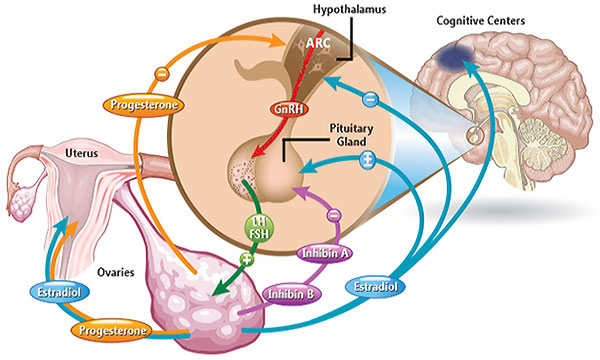-

-
Janet E. Hall, M.D., M.S. (Retired)
Senior Investigator -
Tel 617-877-1112
[email protected]
Research Summary

Janet Hall, M.D., M.S., heads the Reproductive Physiology and Pathophysiology Group and holds a secondary appointment in NIEHS Reproductive and Developmental Biology Laboratory.
The Reproductive Physiology and Pathophysiology Group studies the mechanisms involved in the integrated control of the reproductive system in women and its disruption in reproductive disorders. The research focus, within the broad area of women’s health, is on the neuroendocrine interactions that govern normal reproduction. The group has used this information as a backdrop to provide insights into the pathophysiology of clinical reproductive endocrine disorders, translating this information to provide physiologically-based treatments.
Investigation of the neuroendocrine control of the reproductive system in women requires the use of a combination of complementary models. To this end, group members have studied normal women and those with congenital or acquired deficiencies or abnormalities in the secretion or the responsiveness to gonadotropin releasing hormone (GnRH). Patients may present with absent or delayed puberty, irregular menstrual cycles or loss of cycles after they have been established. In these studies, Hall and her group utilized frequent blood sampling for measurement of LH as markers of GnRH secretion and developed and utilized physiologic probes including GnRH, GnRH agonists and antagonists and estradiol, estrogen receptor blockers and aromatase inhibitors, as well as neuroimaging modalities. Recent studies have also focused on the neuroendocrine interaction between energy deprivation, stress and the reproductive system. Other studies have involved the role of endocrine disrupting chemicals on the reproductive system.
A new area of interest is precision environmental health. Studies are determining how the external and internal exposomes, alone or in combination with our genes, impact human health and determine the risk of disease.
Major Areas of Research
- Understanding the integration of hypothalamic, pituitary, and ovarian signals responsible for repeated cycles of development and ovulation of a single dominant follicle in women.
- Determining the role of neuroendocrine disruption in menstrual cycle dysfunction including hypothalamic amenorrhea and polycystic ovarian syndrome.
- Understanding the neuroendocrine and ovarian contributions to reproductive aging and determining the effect of aging on neurocognitive responses to estrogen.
- Determining genotype/phenotype relationships in GnRH deficiency.
- Advancing the science of precision environmental health.
Current Projects
- Determining the role of genes involved in congenital hypogonadotropic hypogonadism, metabolism and stress in functional hypothalamic amenorrhea.
- Investigating factors that determine the variable susceptibility to disruption of GnRH secretion in normal women in response to energy restriction, an environmental stress that is frequently associated with hypothalamic amenorrhea, studying both hormonal and metabolomic measures.
- Using deep phenotyping studies in patients with Kallmann Syndrome or normosmic hypogonadotropic hypogonadism (GnRH deficiency) to determine both genotype/phenotype relationships and the optimal clinical work-up in this patient population.
- Determining the presence of known and novel genes in patients with GnRH deficiency.
-

Determining the role of the environment and genetics in human disease in the Personalized Environment and Genes Study (PEGS).
Hall is an internationally known clinician and clinical investigator. She received her Masters of Medical Sciences in exercise physiology and her M.D. and Internal Medicine training at McMaster University in Ontario, Canada. She completed her training in Endocrinology and Metabolism at Massachusetts General Hospital in Boston and rose to the rank of Professor of Medicine at Harvard Medical School. She had continuous NIH extramural grant funding until moving to the NIEHS intramural program in 2015. Hall was elected to the Association of American Physicians in recognition of her contributions to both the science and academics of medicine and, as a leader in the field, is a former President of the Endocrine Society.


